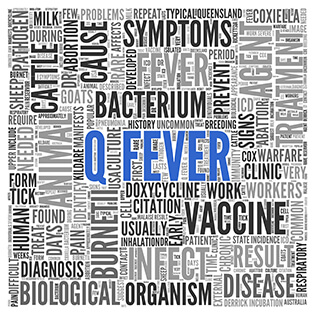Q Fever Research Consortium (QRC)

The Q Fever Research Consortium has been established to address the unrecognised burden of Q Fever in rural NSW and QLD and protect the health of high risk groups of people living in these regions. The consortium is a multidisciplinary collaboration of researchers and public health practitioners from NSW, QLD and VIC with expert knowledge in public health, microbiology, clinical immunology, economics, computational science, biostatistics, epidemiology, and primary health care practice.
The research program planned by the Consortium is reflective of the multidisciplinary group and includes modelling the relationship of Q Fever notifications with livestock movement and extreme climate events; an economic analysis of chronic Q Fever; determining and improving vaccination uptake among high risk groups; and the development of in vitro tests to assess cell mediated immunity and improved Q Fever vaccine candidates.
All research undertaken by the Consortium will include consumer representation.
Members of the Q Fever Research Consortium
NSW
| Member | Institute | Contact Details |
|---|---|---|
| Professor Natkunam Ketheesan, Professor of Biomedical Science, School of Science and Technology | University of New England | Email: nkethees@une.edu.au Tel: +61 2 6773 2991 |
| Professor Geetha Ranmuthugala, Adjunct Professor, Faculty of Medicine & Health | University of New England | Email: granmuth@une.edu.au |
| Associate Professor Michelle Guppy, General Practice, School of Rural Medicine | University of New England | Email: mguppy2@une.edu.au Tel: +61 2 6773 3579 |
| Dr Brenda Vo, Lecturer in Statistics, School of Science and Technology | University of New England | Email: bvo3@une.edu.au Tel: +61 2 6773 1896 |
| Professor Frances Quirk, Adjunct Professor, Faculty of Medicine & Health | University of New England | Email: fquirk@une.edu.au |
| Associate Professor Edouard Tursan D’Espaignet, Epidemiologist, School of Rural Medicine | University of New England | Email: edouard.tursandespaignet@newcastle.edu.au |
| Professor Rod McClure, Research Professor, Faculty of Medicine and Health | University of New England | Email: rmcclure@une.edu.au |
| Associate Professor Peter Massey, Program Manager Health Protection, Hunter New England Population Health | NSW Health, Hunter New England Local Health District |
Email: peter.massey@hnehealth.nsw.gov.au Tel: +61 2 49246486 |
| Professor David Durrheim, Director, Health Protection Unit, Hunter New England Health | NSW Health, Hunter New England Local Health District | Email: David.Durrheim@hnehealth.nsw.gov.au |
QLD
| Name | Institute | Contact Details |
|---|---|---|
| Dr Robert Norton, Director of Microbiology, Townsville Hospital | QLD Health | Email: Robert.Norton@health.qld.gov.au |
| Associate Professor Brenda Govan, Head of Biomedicine | James Cook University |
Email: brenda.govan@jcu.edu.au Tel: +61 7 4781 5607 |
| Dr Hillary Vanderven, Lecturer in Immunology and Infectious Diseases, Biomedicine | James Cook University |
Email: hillary.vanderven@jcu.edu.au Tel: +61 7 478 16799 |
| Associate Professor Ricardo Soares Magalhães, Population Health and Biosecurity; Head, UQ Spatial Epidemiology Laboratory and a European Specialist in Population Medicine | University of Queensland |
Email: r.magalhaes@uq.edu.au Tel: +61 7 54601 827 |
VIC
| Name | Institute | Contact Details |
|---|---|---|
| Dr Stephen Graves, Medical Director | Australian Rickettsial Reference Laboratory Foundation | Email: graves.rickettsia@gmail.com |
| Dr John Stenos, Research Director | Australian Rickettsial Reference Laboratory Foundation | Email: Johns@barwonhealth.org.au |

